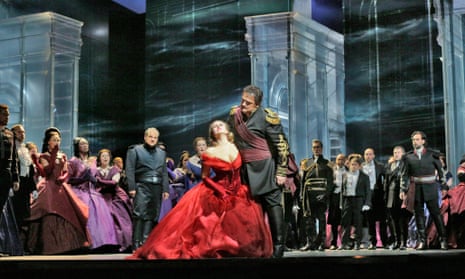Though general manager Peter Gelb might be weary of putting out fires, it’s not altogether bad to have a little controversy before the opening of a season at the Met. Whatever strife may result, the disputes tend to remind us that opera still matters to a large and diverse audience.
This year’s pre-season topic – specifically, white actors’ history of employing blackface when singing the title role in Verdi’s Otello – was more intellectually valuable than 2014’s inside-baseball whisperings about contract negotiations between labour and management. To recap this summer’s intrigue: after some early promotional posters seemed to indicate that Latvian tenor Aleksandrs Antonenko would appear in blackface for director Bartlett Sher’s season-opening new production of Otello (and after the emails poured in), Gelb reached out to several outlets, in order to make clear that the house was officially abandoning the longstanding practice.
So far, all to the good. And yet, the lack of offensive makeup to one side, the matter of a light-skinned tenor playing “the Moorish captain” still poses dramatic questions (in addition to legitimate concerns about casting diversity, in the first instance). While the racial politics of the original drama don’t map precisely on top of those of our contemporary era, it would be difficult to deny that Otello, the character, is still shaped by perceptions of his own outsider status. And because Verdi and his librettist cut Shakespeare’s first act – with its references to Otello’s experience under slavery and its depiction of early reactions to his interracial union with Desdemona – the danger with Verdi’s Otello is that the captain will come across as simply a paranoid person who is devoid of motivation, and too easily manipulated by Iago. Given that truncated psychology, the title role can be every bit as much an acting challenge as it is a singing one.
For the first half hour of the performance on Monday night, there didn’t seem to be much of a strategy to address these lingering dramatic issues. At the outset, Antonenko put his effort into hitting his marks and his notes – sounding a bit strained, on occasion. Baritone Željko Lučić’s Iago was sung solidly, but nothing in his initially workmanlike stage presence offered any help to the rest of the cast. So it was up to Desdemona – sung and acted brilliantly throughout the night by Sonya Yoncheva – to elevate the production. Her act one love duet with Otello is one of the rare points in the opera during which Otello’s complex backstory is given some stage time (it incorporates some of the themes of Shakespeare’s original act one, scene three). The “your love saved me” trope is common in opera, but Antonenko’s performance with Yoncheva made this particular recollection of romantic grace sound distinct.
This article includes content hosted on api.smugmug.com. We ask for your permission before anything is loaded, as the provider may be using cookies and other technologies. To view this content, click 'Allow and continue'.
They built on that success, creating a momentum that drove the remainder of the performance. And when Lučić was prodded into physical business by Jennifer Johnson Cano’s spirited Emilia, he gained strength, too. The scene in which members of both couples are simultaneously grappling with one another’s motives was a highlight, not least because it showed conductor Yannick Nézet-Séguin’s sly feel for building to one of Verdi’s orchestral climaxes. Nézet-Séguin sounded in lockstep with the orchestra all night long, frequently bringing out delicious details – as with the excitable woodwinds that accompany Otello’s dark glee, in the moment when he believes himself justified in rejecting “love and jealousy together”. By this point, Antonenko’s voice had settled in, sounding rich throughout his range. And his performance had cohered, as well: here was an Otello weary of not quite being able to believe his turn in fortunes, and thus willing to throw good love overboard, rather than live in the eternal grip of insecurity.
Antonenko’s mix of self-righteousness and self-care was subtly powerful here – though you wouldn’t quite know it from the stage lighting favored by Sher’s production. Simplistic, blood-red tints seemed to overtake large portions of the big Met stage whenever a character gave voice to an unkind thought,even when Verdi’s actual music presented a more complex emotional field of play. Still, this safe, gently modernized production avoided grave errors, and presented the action with clarity. The main draw for the rest of the run is going to be Yoncheva. (She had a strong act four Willow Song and Ave Maria, too.) Desdemona is a role that sopranos from prior generations have used to build careers at the Met, and given the audience response on Monday, Yoncheva is well on her way to joining their ranks. As this run continues, there may be more benefits to wring from the broader cast, as well. But for now, this production has emerged as a solid start to the opera season in New York.

Comments (…)
Sign in or create your Guardian account to join the discussion